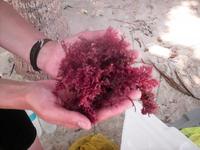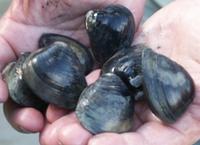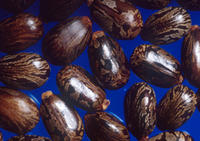-
Malaria increasingly resistant to drugs, seaweed could be the answer

Researchers recently found a natural substance that can destroy the malaria parasite; the substance is from a red seaweed found off the island of Fiji; the discovery of the substance comes at a much needed time as malaria has developed increasing resistance to existing drugs; the new substance comes from a chemical that that the plant uses to defend against marine fungi; it is entirely different than existing drugs and could be the key against fighting drug-resistant strains of malaria; the substance must still undergo further laboratory tests before it can be used in clinical trials
-
-
Abbott shows new pathogen detector
Illinois-based pharmaceutical company Abbott unveiled a new assay system that can accurately detect seventeen different bio-threat pathogens; among different bio-agents targeted in the new test are Bacillus anthracis, E. coli, salmonella, Ebola virus, and avian influenza viruses; the company says the new method provides results in less than eight hours
-
-
Climate change linked to food safety, cost
Changing climate could make food more dangerous, add to the malnourishment of millions, and change even what we eat; for every degree the ambient temperature rises above 6 degrees Celsius — or 43 degrees F — temperature in an area, the occurrence of food-borne salmonella poisoning increases by 12 percent; drought can cause a loss in plant vigor, making plants more susceptible to disease; floods and heavy rains favor the growth of fungal pathogens on leaves, and many disease-causing organisms can spread in changing wind currents
-
-
Harris Corp. awarded $9 million Army contract to boost biodefense
The U.S. Army recently signed a $9 million deal with Harris Corp. to bolster the army’s biological defense capabilities; Harris will provide the Army’s Joint Biological Point Detection System (JBPDS) with its advanced Falcon II AN/PRC-150 high-frequency radio system; the radio system is capable of detecting and identifying biological warfare agents and will automatically send alerts to headquarters when it senses the presence of these agents; JBPDS is a portable self-contained unit designed to automatically detect and identify airborne biological agents
-
-
Common clam to help clean oil-filled waters

Clams are bottom-dwelling filter feeders, obtaining nutrients by filtering the water around them; researchers at Southeastern Louisiana University are studying the lowly Rangia clam to determine whether the organism can contribute to helping clean oil-polluted waters
-
-
New pathogen detection test dramatically reduces wait times
An Illinois based pharmaceutical company, recently introduced Plex-ID, a new detection system that can accurately identify seventeen different dangerous biological pathogens; the system fills a critical gap in detection capabilities as it can analyze direct samples like blood, food, water, or air filters and provide results in less than eight hours; current blood and tissue tests take three or more days; in the event of a biological attack, detecting pathogens in infected persons is critical as these people will continue to spread the disease unless quarantined; the Plex-ID system has already helped identify an unknown disease in Afghanistan; after eighty-three people became sick with a mysterious disease and seventeen people died, the Plex-ID system accurately identified the disease as bubonic plague when other tests failed
-
-
Netherlands battles to contain Q fever outbreak
The Netherlands has struggled to contain an outbreak of Q fever that first began in 2007; since the outbreak started there have been more than 4,000 confirmed cases of the disease and eleven deaths; farm animals are the primary carriers of the bacteria, and humans can become infected by breathing in contaminated air or consuming infected dairy products; after more than 2,200 people became sick in 2009, the Dutch government slaughtered over 50,000 goats in an effort to stem the spread of the disease; veterinarians and epidemiologists from around the world are watching the outbreak closely to learn more about the disease and how it is spreading; the Center for Disease Control and Prevention (CDC) had confirmed eight cases for 2011
-
-
Budget cuts will hamper U.S. outbreak response
Public health advocates are criticizing the Obama administration’s 2012 budget request for cutting funding from the U.S. Centers for Disease Control and Prevention’s (CDC) emergency preparedness and core disease prevention programs; advocates believe that these cuts will seriously hamper the ability of the United States to respond effectively to large disease outbreaks or a biological terrorist attack; since 2005 funding for these programs has been reduced by nearly 30 percent, and in 2008 more than 20,000 public health jobs have been cut while thousands of workers have had their hours reduced; GAO reports warn that the federal government needs to strengthen its abilities to respond to pandemics, bioterrorism, and natural disasters
-
-
Drought in China threatens wheat crop and send global prices soaring

UN Food and Agriculture Organization (FAO) warned that a severe drought was threatening China’s wheat crop and could result in shortages of drinking water; analysts fear that wheat prices could soar even higher if China were to begin importing large quantities of food to feed more than a billion hungry mouths; wheat prices are already at record highs and have sparked food related protests around the world; surging prices are partially responsible for Egypt and Tunisia’s recent mass uprisings; China’s Shandong province, a major agricultural region, has only received fifteen percent of its normal rain levels; in dire terms Chinese state media reported that “land is drying out, and the crops are dying”
-
-
Museum exhibit stages immune systems championship
Dublin’s Science Gallery offers a new exhibit/game: lab scientists take white blood cells from gallery visitors and then pit them (the cells, not the visitors) against each other in a Petri dish to determine which immune system is stronger; the exhibit, called Blood Wars, allows winning blood cell samples move on to the next round, battling other immune systems until a champion is declared
-
-
U.S. unprepared for climate-induced disease outbreaks
Officials warn that the United States is not equipped to handle the spread of infectious diseases caused by climate change; little investment or progress has been made in bolstering disease detection and response capabilities in the United States, despite warnings from intelligence agencies; increased heat, humidity, and rainfall have caused the spread of mosquitoes and other bugs which carry deadly tropical diseases to new areas where people have yet build up a resistance; the United States is now experiencing outbreaks of dengue fever and West Nile virus; in 2010 the CDC reported 110 deaths and 1,356 cases of West Nile virus in the United States; intelligence agencies also worry about the potential for the spread of these diseases to destabilize fragile nations across Asia and Africa
-
-
New Zealand fears uncontrollable measles outbreak
Public health officials in New Zealand are racing to contain a measles outbreak that may have infected more than 300 people; measles is a highly infectious virus that can be spread through sneezing or coughing; the outbreak began with nine infected passengers aboard a flight; so far officials have identified eleven cases; two cases were from people not aboard the flight suggesting that the disease has begun to spread from person to person; out of every 1000 cases, there is typically one death and 100 hospital admissions; health officials are racing to identify people who may have come into contact with the infected and limit exposure; officials are concerned that they cannot contain the spread of the disease
-
-
A fast, simple test for detecting cholera
The new detection method uses specially prepared nanoparticles of iron oxide, each barely 1/50,000th the width of a single human hair, coated with a type of sugar called dextran; to achieve this, the scientists looked for specific characteristics of the cholera toxin receptor (GM1) found on cells’ surface in the victim’s gut, and then they introduced these features to their nanoparticles; when the magnetic nanoparticles are added to water, blood, or other fluids to be tested, the cholera toxin binds to the nanoparticles in a way that can be easily detected by instruments
-
-
Terror attack fears over London virus superlab
Experts express concern over the 600 million Pound virus “superlab” planned for St. Pancras, London; the 14-story, maximum security site containing viruses including malaria, tuberculosis, bird and swine flu, cancer cells, and HIV would need to be “bulletproof” to withstand not only an earthquake, a bomb, or fire — there are also worries that Tube trains running through King’s Cross and Euston stations could ruin delicate and expensive laboratory equipment
-
-
Ohio man indicted on possession of deadly bioagent ricin

Jeff Boyd Levenderis, 54, of Akron, Ohio has been indicted by a federal grand jury for a false statement and for the possession of ricin, a Schedule 1 substance capable of being processed and employed as a biological or chemical weapon according to the Chemical Weapons Convention; Levenderis’ attorney has said that no evidence has been found that his client had ever intended to harm anyone
-
More headlines
The long view
We Ran the C.D.C.: Kennedy Is Endangering Every American’s Health
Nine former leaders of the Centers for Disease Control and Prevention (CDC), who served as directors or acting directors under Republican and Democratic administrations, serving under presidents from Jimmy Carter to Donald Trrump, argue that HHS Secretary Roert F. Kennedy Jr. poses a clear and present danger to the health of Americans. He has placed anti-vaxxers and conspiracy theorists at top HHS positions, and he appears to be guided by a hostility to science and a belief in bizarre, unscientific approaches to public health.
